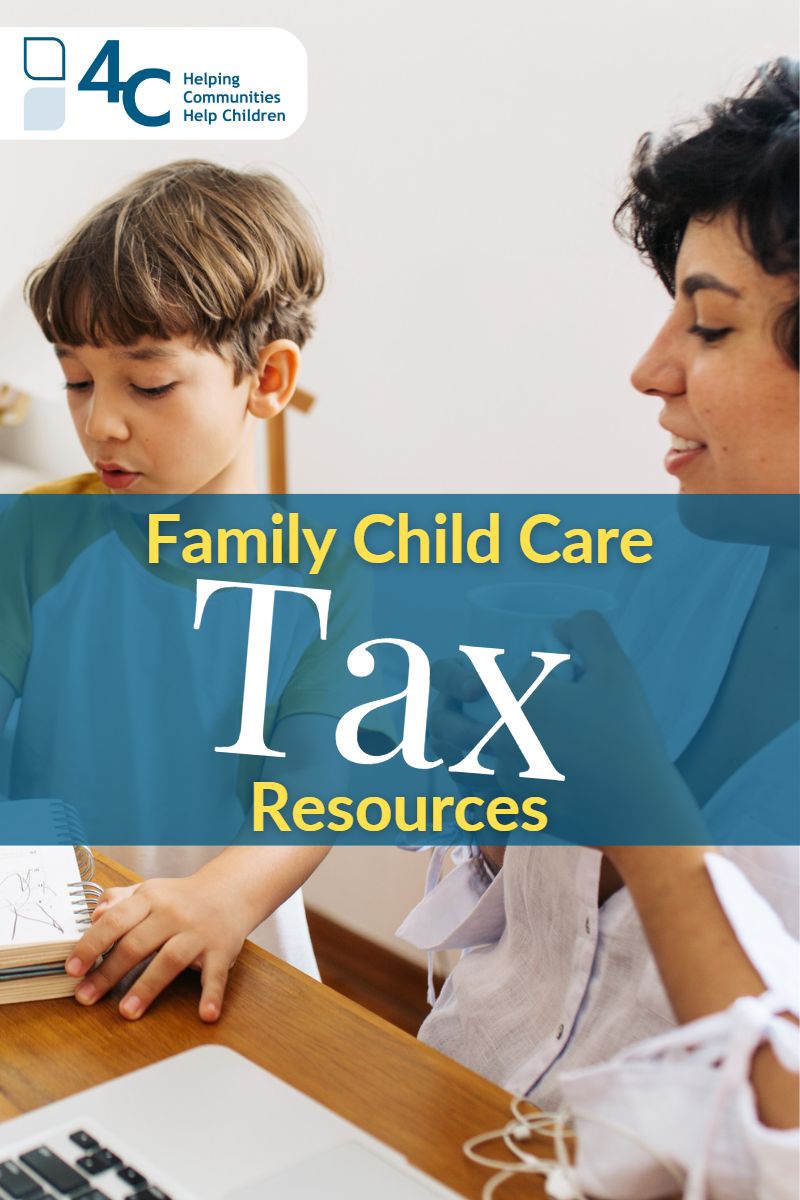March 2023 – Published by 4-C
Family child care providers have a lot to manage when it comes to running their business, from providing high-quality care to children to managing finances and taxes. For many, understanding the tax laws and regulations that apply to their business can be challenging. While 4-C can’t offer specific advice, we’ve gathered some resources to help family child care providers prepare for tax season.

Record Keeping
One of the most critical areas for family child care providers to understand is record-keeping. Keeping accurate records is essential for claiming tax deductions and preparing for an audit. Additionally, understanding what expenses are deductible can be a crucial aspect of managing your finances and taxes.
Here are some of the most common deductible expenses that family child care providers can often claim:
- Home expenses: Providers can deduct a portion of their home expenses, such as mortgage interest, property taxes, utilities, and repairs, based on the percentage of their home used for business.
- Food expenses: Providers can deduct the cost of food served to children in their care, as long as the food is nutritious and meets the requirements of the Child and Adult Care Food Program (CACFP).
- Supplies and equipment: Providers can deduct the cost of supplies and equipment used for business purposes, such as toys, books, and educational materials.
- Transportation expenses: Providers can deduct transportation expenses related to their business, such as mileage, parking fees, and tolls.
- Professional development: Providers can deduct expenses related to professional development, such as trainings and conferences.
It’s essential to keep accurate records of all of these and other business-related expenses to support deductions claimed on tax returns.
Professional Support
Record-keeping software can be a helpful tool for tracking expenses and generating reports for tax purposes. Providers should also consult with a tax professional to ensure they are complying with tax laws and regulations and claiming all eligible deductions.
In addition to deductible expenses, family child care providers can benefit from the following:
- Plan ahead: Providers should plan their finances and taxes in advance to avoid any surprises. This may include setting aside money for taxes throughout the year and keeping track of deductible expenses.
- Keep up-to-date with tax laws and regulations: Providers should stay informed about any changes in tax laws and regulations that may affect their business. Subscribing to tax-related newsletters or websites can help providers stay informed.
- Seek advice from a tax professional: Consulting with a tax professional can provide personalized advice on tax-related issues and ensure compliance with tax laws and regulations.
As a family child care provider and business owner, staying informed about policy changes that could impact your finances is crucial. By understanding tax laws and regulations, as well as staying informed about policies that could affect child care, providers can ensure they are providing the best possible care to children while also running a successful business.
Here are some resources to help keep you informed:
- Child Care Aware of America: From updated tax changes to ideas on marketing a child care business, this website offers plenty of amazing resources for providers and parents
- Be sure to check out their Wisconsin Resources page
- Tom Copeland Blog is now CIVITAS Strategies: the nation’s leading experts on the business of family child care
- NAFCC: Featured Resources and Tax Guides
- IRS.gov: You can always check to ensure the information you’ve found is correct by visiting the federal government’s Internal Revenue Service website
- For state taxes, be sure to visit Wisconsin Department of Revenue Business page
